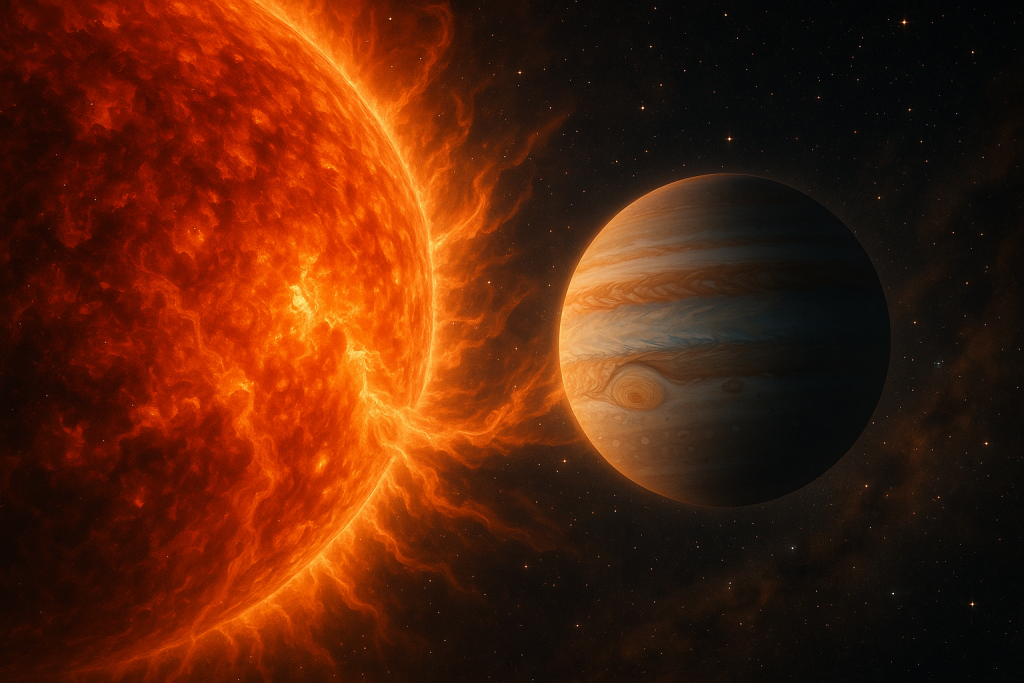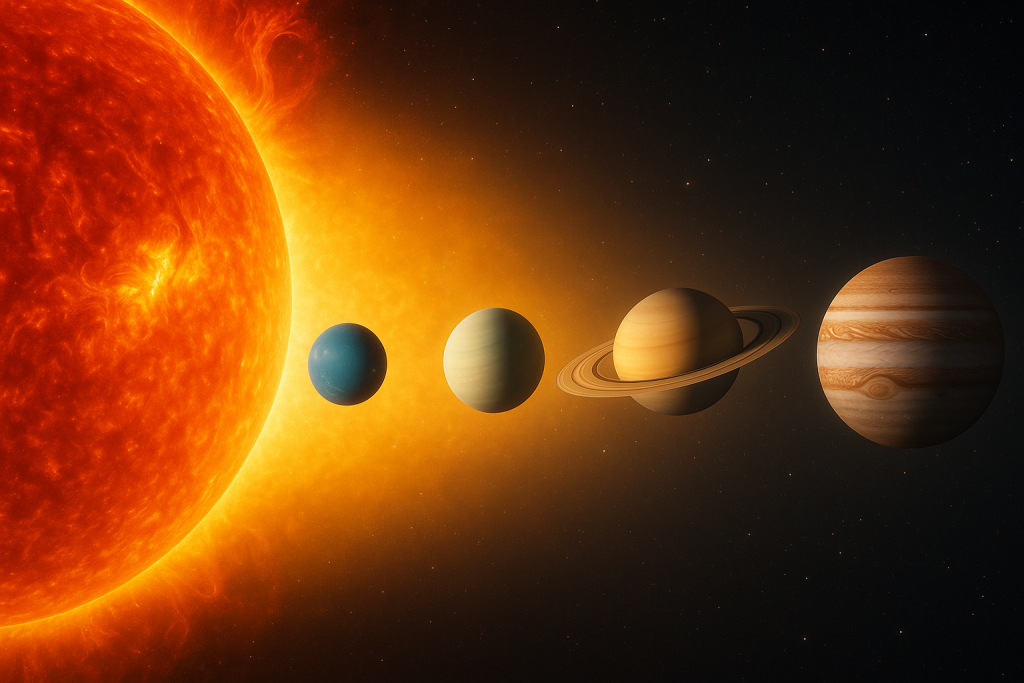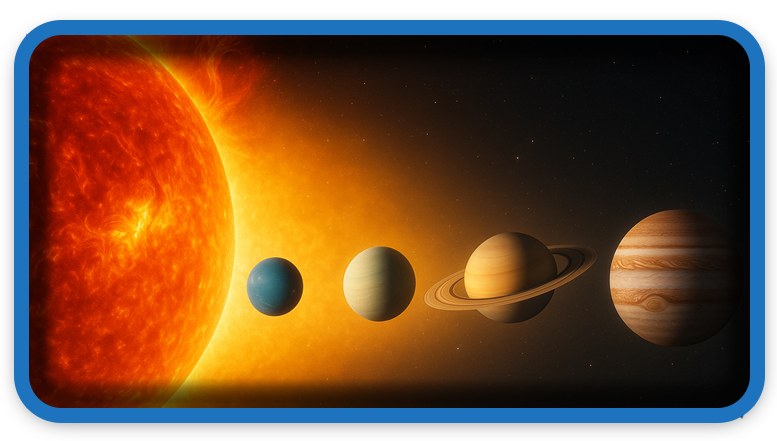⏲️ Estimated reading time: 5 min
What Happens to Outer Planets When the Sun Expands? When the Sun becomes a red giant in about 5 billion years, the fate of the outer planets Jupiter, Saturn, Uranus, and Neptune will drastically change. Here’s how their orbits, atmospheres, and long-term futures will evolve under a dying star.
🌞 The Sun’s Expansion: Quick Overview
The Sun, currently a stable main sequence star, will eventually run out of hydrogen fuel. At that point, it will begin burning helium and swell to become a red giant. This process marks the beginning of the end of our solar system as we know it.
Key developments include:
- The Sun will grow hundreds of times larger in radius.
- Inner planets like Mercury and Venus will likely be swallowed whole.
- Earth may be consumed or scorched, depending on exact dynamics.
- The solar wind will intensify, blowing away a significant portion of the Sun’s mass.
While the inner solar system is doomed, what about the outer planets?
🪐 Impact on the Outer Planets
The gas and ice giants Jupiter, Saturn, Uranus, and Neptune will experience significant changes, though not as extreme as their inner neighbors.
1. 🛡️ They Won’t Be Swallowed
The red giant Sun will expand to a radius of 1 to 2 AU (astronomical units). For reference:
- Earth: 1 AU
- Jupiter: ~5.2 AU
- Saturn: ~9.5 AU
- Uranus: ~19.8 AU
- Neptune: ~30 AU
Since the outer planets orbit far beyond this range, they won’t be engulfed by the expanded Sun.
✅ Survival confirmed: They remain physically intact.

2. 🌌 Orbital Expansion
As the Sun sheds its mass via powerful solar winds, its gravitational pull will weaken.
- Outer planets will experience orbital drift.
- Their orbits will expand, possibly by 10% to 30%.
- The farther the planet, the more pronounced the drift.
🧠 Why this happens:
Kepler’s laws and Newtonian mechanics show that if the central mass decreases, orbital distances must increase to conserve angular momentum. If the Sun loses half its mass, orbits can nearly double in radius.
3. 🌙 Moons and Rings Stability
Each outer planet has a complex system of moons and rings. Here’s what might happen:
- Moons will stay bound to their planets due to strong local gravity.
- Some moons may migrate slightly outward, mirroring planetary orbital shifts.
- Ring systems (like Saturn’s) might evolve due to increased radiation and particle pressure.
📌 Bottom line: While there may be minor changes, moons and rings will remain stable overall.
4. 🔥 Atmospheric Changes
The Sun’s increased brightness and solar wind may slightly alter the outer planets’ atmospheres.
- Outer gas giants like Jupiter and Saturn may experience minor heating of their upper layers.
- Increased solar radiation might cause some atmospheric expansion, but this will be superficial.
- The deep interiors and main structures will remain unaffected.
💡 Note: The atmospheres of these planets are already extremely thick, making them resilient to small solar shifts.

5. 💥 Will They Ignite or Transform?
Despite the intense heat from the red giant Sun, outer planets:
- Will not ignite or begin nuclear fusion.
- Remain cold giants Jupiter and Saturn made mostly of hydrogen and helium.
- Lack the critical mass and pressure required for fusion reactions.
🧊 Conclusion: They stay as gas or ice giants.
6. 🌀 Long-Term Fate
After its red giant phase, the Sun will:
- Expel its outer layers into space forming a planetary nebula.
- Leave behind a white dwarf, a dense stellar remnant about the size of Earth but with about half the mass of the current Sun.
🔭 What happens next?
- Outer planets continue orbiting the white dwarf.
- Their orbits will be wider and slower.
- Over billions to trillions of years, gravitational tugs from passing stars or the galactic core could destabilize these orbits.
✨ Could Outer Planets Become Rogue Planets?
Yes, but only in the far distant future.
Over cosmic timescales:
- Stellar flybys or nearby supernovae could nudge planets off-course.
- Gravitational interactions with other objects or remnants could cause ejection from the solar system.
These planets would then become rogue planets, drifting through space with no parent star.
📊 Summary Table
| Feature | Before Expansion | During Red Giant Phase | After White Dwarf Stage |
|---|---|---|---|
| Distance to Sun | Stable | Increases | Further increases |
| Temperature | Cold | Slight increase | Drops again |
| Orbit | Stable | Expands | Slower and wider |
| Planetary Integrity | Intact | Remains intact | Still intact |
| Possibility of Ejection | Extremely low | Low | Higher over billions of years |
🔭 Final Thought: Galactic Wanderers
The outer planets survive the solar apocalypse, but they are not untouched. Their orbits stretch, their moons adjust, and their skies subtly brighten until the Sun becomes a ghost, a white dwarf glowing in the cosmic dark.
In the deep time that follows, the outer planets may either:
- Remain loyal satellites of the white dwarf,
- Or be flung into interstellar space ghost ships in a dying galaxy.
🪐 It’s a poetic end to a solar system that began with such brilliance.
🔔 For more tutorials like this, consider subscribing to our blog.
📩 Do you have questions or suggestions? Leave a comment or contact us!
🏷️ Tags: outer planets, sun expansion, red giant, white dwarf, jupiter, saturn, uranus, neptune, rogue planets, solar system
📢 Hashtags: #SunExpansion #OuterPlanets #RedGiant #WhiteDwarf #SpaceFuture #AstronomyFacts #Jupiter #Saturn #SolarSystem #GalacticEvolution
Only logged-in users can submit reports.
Discover more from HelpZone
Subscribe to get the latest posts sent to your email.

